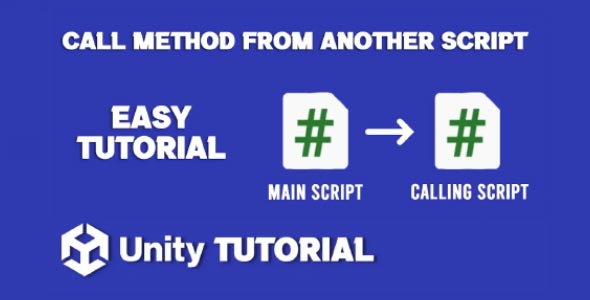When working in Unity, one of the most common tasks you’ll face as a developer is figuring out how to make in Unity call method from another script. Whether you’re building small prototypes or large-scale games, organizing your code across multiple scripts is not only inevitable but necessary for clarity and maintainability.
Calling methods between scripts allows for better separation of concerns. For instance, your player movement code should be separate from your health system, and your UI manager shouldn’t be tangled up with your enemy behavior. However, for these systems to work together, they still need to communicate efficiently—and that’s where method calling across scripts comes in.
In this article, we’ll break down how to achieve this, explore common use cases, and understand when and why it matters for your Unity projects.
How To Call A Function From Another Script Unity
Understanding how to call a function from another script Unity is foundational for anyone working beyond a single-script setup. It’s the backbone of modular development and enables different components to interact without redundancy.
At its core, calling a function from another script involves two key elements:
-
Access: The script that contains the method must be accessible from the calling script. This usually means the method is marked as public.
-
Reference: The calling script needs a reference to the script instance containing the method.
In many practical scenarios, this communication allows for useful gameplay mechanics—such as triggering animations, updating scores, or enabling and disabling objects. For example, when a player picks up an item, you might need to update the inventory system, notify the UI, and perhaps trigger a sound effect—all of which likely live in different scripts.
By mastering how to call a function from another script Unity, you’re setting the stage for cleaner, more flexible code that scales well as your game grows.
Why Inter-Script Communication Matters In Unity
If you’re working with Unity for anything beyond a tutorial or prototype, you’ll quickly find that packing everything into one script is unsustainable. Game projects naturally evolve into a network of interconnected systems. Being able to call methods between scripts helps you:
-
Reduce duplication: Call a central function instead of rewriting logic.
-
Increase flexibility: Swap out systems or behaviors without breaking everything.
-
Improve readability: Cleanly separate roles and responsibilities in your code.
-
Enable teamwork: Easier collaboration when systems are modular and decoupled.
These benefits ultimately lead to a more maintainable project, especially in larger teams or long-term development environments.
How To Call A Script From Another Script Unity
While calling a function is a common task, there are also moments where you need to understand how to call a script from another script Unity in a broader sense. This means not just triggering a function, but interacting with the script’s overall behavior, properties, or state.
For instance, say you have a script that controls your enemy AI. Another script—perhaps your game manager—might need to pause that AI, change its behavior mode, or retrieve current status data. These actions go beyond just one method call; they involve accessing and interacting with the entire script component.
When thinking about how to call any script from another script, consider the following:
-
GetComponent is your friend: Most interactions begin with locating the desired script via Unity’s component system.
-
Public variables and properties: These allow controlled access to a script’s inner workings.
-
ScriptableObject patterns: For more advanced setups, these offer clean data-driven communication without direct dependencies.
Maintaining separation while ensuring connectivity between scripts is the mark of a well-architected Unity project.
Real-World Use Cases For Inter-Script Communication
To better understand why Unity call method from another script functionality is so essential, let’s look at some everyday use cases:
1. UI Updating from Gameplay Scripts
Imagine you have a Unity 2D Health Bar script managing your player’s health. When damage is taken, you want to update the health bar. The UI script doesn’t monitor the player’s status continuously—it only updates when told to. This is a classic example of one script needing to call a method on another.
2. Triggering Animations or Sounds
Your enemy AI might detect the player and decide to attack. Instead of handling animation and audio directly, the AI script calls a method on the AnimationController and AudioManager, delegating those responsibilities to more appropriate scripts.
3. Scene and Game Flow Control
Game managers often coordinate scene transitions, score updates, and state changes. These high-level systems regularly interact with various lower-level components to control game flow, such as ending a level, disabling player control, or triggering UI animations.
These examples all demonstrate the power and necessity of calling methods across scripts for modular, event-driven gameplay.
Best Practices For Script Interaction In Unity
Calling methods across scripts is straightforward in theory, but good architecture goes beyond just functionality. Here are some best practices when implementing inter-script communication:
-
Avoid tight coupling: Don’t hardcode dependencies; use interfaces or events when appropriate.
-
Use Events and Delegates: Let scripts subscribe to changes instead of being directly called.
-
Organize scripts logically: Group related scripts (like UI, player, or enemy) into folders or namespaces.
-
Document your methods: Clear naming and summaries make it easier to understand what each method does.
-
Limit public exposure: Only expose what other scripts truly need to access.
By following these principles, you’ll reduce bugs, simplify maintenance, and make your code more adaptable to future changes.
Let’s revisit how to call a script from another script Unity and take a moment to consider architecture. This goes beyond just functional access—it’s about long-term project health.
For example, if your game manager script is directly referencing multiple systems (audio, player control, enemy spawner, etc.), your code can quickly become fragile. Instead, using interfaces or an event-based system allows different scripts to stay loosely coupled.
This becomes especially important in team environments. Decoupling systems reduces merge conflicts, simplifies collaboration, and allows independent development across different features or systems.
So while direct script-to-script calling is helpful, using tools like Unity Events, ScriptableObjects, or dependency injection can future-proof your project.
Conclusion
Whether you’re building a simple puzzle game or a sprawling open-world experience, learning how to make in Unity call method from another script is a foundational skill that leads to cleaner, more organized code. From UI updates to gameplay logic and system coordination, inter-script communication plays a key role in building responsive, scalable Unity projects.
To recap:
How to call a function from another script Unity enables modular code, reduces redundancy, and improves maintainability. It allows you to separate responsibilities across different components while keeping your project easy to scale and debug.
How to call a script from another script Unity goes beyond single method calls to interacting with full systems or components. This is essential when building interconnected systems like AI, game managers, UI controllers, and other gameplay features.
Applying good architectural practices—like avoiding tight coupling—makes your codebase easier to manage and extend.
Mastering these techniques not only makes you a more effective Unity developer but also opens the door to more sophisticated and collaborative game development.
Calling a method from another script is a key part of organizing code in Unity, especially in larger projects. Alongside method calls, you’ll often need to work with shared data. To learn how to do that properly, check out our How To Access Variables From Another Script Unity tutorial, which explains how to reference and use variables across different scripts.



